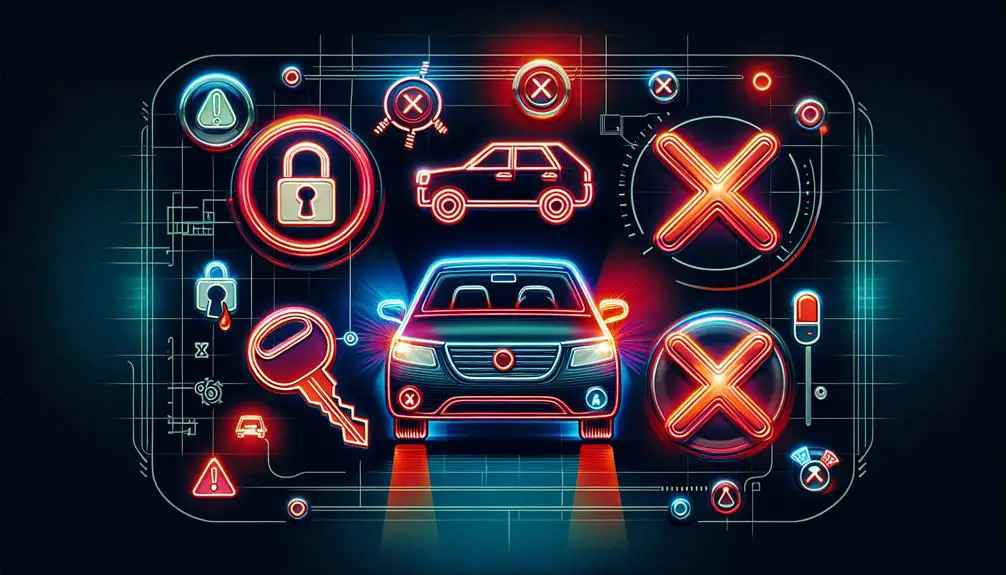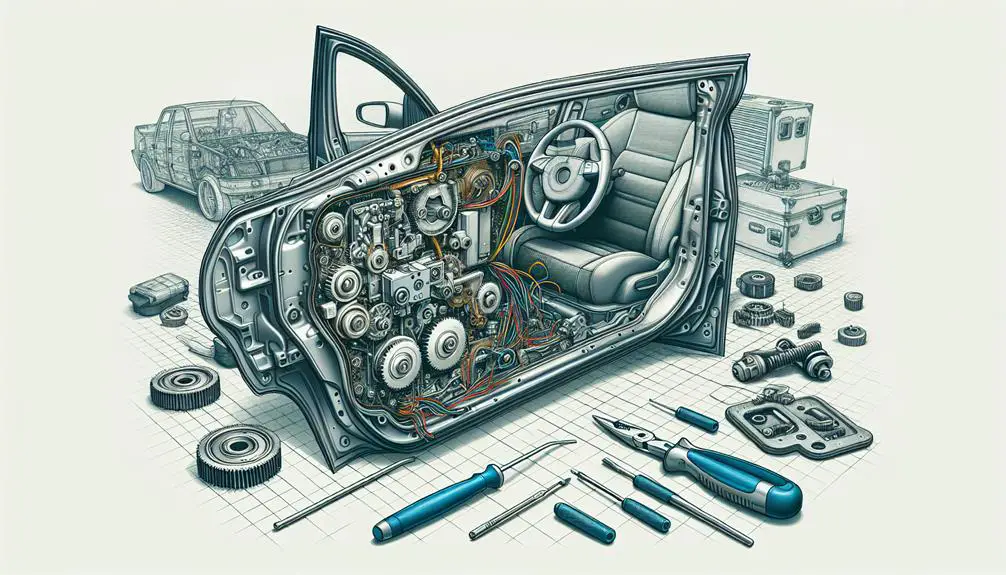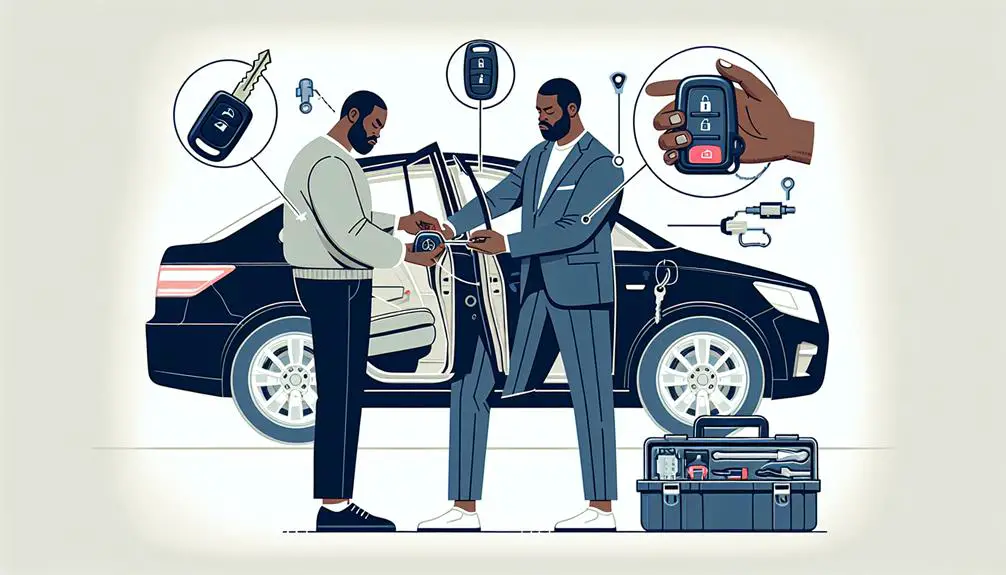Hyundai door lock not working can be due to several factors:
- Dead key fob batteries
- Faulty door lock actuators
- Other reasons may also contribute to the issue.
This can lead to inconvenience and potential safety concerns for the vehicle owner.
Identifying Common Symptoms

Several Hyundai owners have reported experiencing a range of symptoms indicating their vehicle's door lock mechanism isn't functioning properly. You might notice these issues when you try to unlock or lock your car, and it's vital to understand the underlying causes to address them effectively.
One common symptom is frozen locks, particularly prevalent in colder climates. Moisture can infiltrate the locking mechanism and freeze, preventing the lock from moving. This issue isn't just an inconvenience; it's a security risk. To diagnose, you'll need to check if the problem persists in warmer conditions or after applying a de-icing agent. If it does, the issue might be more mechanical than temperature-related.
Another symptom pointing to a malfunctioning door lock is a misaligned latch. This occurs when the latch doesn't properly catch the strike plate on the car frame. You'll know it's misaligned if the door doesn't stay closed or if there's resistance and noise when locking or unlocking. This misalignment can stem from regular wear and tear or from an impact. Analyzing the alignment between the latch and strike plate can confirm this issue.
Recognizing these symptoms early can prevent further damage and maintain your vehicle's security and functionality.
Dead Key Fob Batteries
Amid the numerous issues affecting Hyundai door locks, dead key fob batteries emerge as a critical yet often overlooked cause. The key fob, acting as the remote control for your car's locking system, depends entirely on its battery to communicate with the vehicle. When the battery wanes, it disrupts this communication, leading to the inability to lock or lock the doors remotely.
Battery replacement is a straightforward yet technical process that involves identifying the correct type of battery for your specific Hyundai model. Typically, this is a CR2032 or CR2025 coin battery, easily purchasable at most electronic or automotive stores. After replacing the battery, it's important to assure that the key fob's internal components are intact and correctly aligned, as even minor misalignments can hinder performance.
In addition, key reprogramming might be necessary post-battery replacement, especially if the key fob fails to operate as expected. Reprogramming is a process that re-syncs the key fob with the vehicle's locking system, re-establishing the communication pathway. This step may require professional assistance, depending on your Hyundai model's complexity and the sophistication of its keyless entry system.
Faulty Door Lock Actuator

While addressing dead key fob batteries can resolve some issues, a non-responsive Hyundai door lock often points to a faulty door lock actuator. The actuator serves as the mechanical heart of your door's locking mechanism, converting the electronic signals from your key fob into the physical action of locking or unlocking. When it fails, thorough analysis and precise action are paramount.
Consider these steps in assessing and addressing a faulty actuator:
- Diagnostic Testing: Utilize a diagnostic tool to confirm the actuator's malfunction. This step is important to avoid unnecessary replacements and ensure that the issue isn't related to the vehicle's electrical system.
- Door Lubrication: Before opting for actuator replacement, attempt door lubrication. Sometimes, the issue stems from friction within the lock mechanism rather than the actuator itself. Proper lubrication can restore functionality with minimal effort and expense.
- Actuator Replacement: If lubrication doesn't solve the problem, actuator replacement becomes important. This process involves removing the door panel to access the actuator, disconnecting it from the door lock assembly, and installing a new unit. Precision and attention to detail during this procedure ensure a successful replacement and restored door lock functionality.
Addressing a faulty door lock actuator involves a blend of diagnostic acumen, strategic lubrication, and, if necessary, meticulous actuator replacement.
Wiring and Electrical Issues
In addressing Hyundai door lock malfunctions, it's important to take into account potential wiring and electrical issues that may impede lock operation. These problems can stem from a variety of sources, but two key areas to scrutinize are corrosion effects and fuse problems.
Corrosion on wires and connectors can severely hamper electrical conductivity. It's a gradual process where moisture and environmental contaminants lead to the deterioration of metal components, eventually causing intermittent or complete loss of function in your door locks. Analyzing the wiring harnesses for signs of corrosion, especially in older models or vehicles exposed to harsh conditions, is critical.
Fuse problems represent another significant factor. Each electrical component in your Hyundai, including the door locks, is protected by a specific fuse designed to blow if the current exceeds safe levels. A blown fuse indicates an overload or short circuit somewhere in the system. Identifying and replacing a blown fuse might resolve the issue temporarily, but it's imperative to investigate further and find the root cause of the overload to prevent future occurrences.
Comprehending these wiring and electrical issues is necessary for diagnosing and fixing your Hyundai's door lock problems effectively, avoiding the pitfalls of misdiagnosis and unnecessary replacements.
DIY Troubleshooting Tips

Before diving into professional repair services, you can perform some straightforward troubleshooting steps to potentially resolve your Hyundai's door lock issues. Here's how you can approach it:
- Check for Frozen Locks: If you're dealing with cold weather, your lock mechanism might've frozen. You can use a de-icer or gently heat your key with a lighter and insert it into the lock. Avoid using hot water as it can worsen the issue.
- Inspect for Misaligned Latch: A latch that doesn't align properly with the strike plate on your car door frame can prevent the door from locking. Examine the alignment by slowly closing the door and observing how the latch meets the strike plate. Adjust the latch or strike plate as needed for proper alignment.
- Lubricate the Lock Mechanism: Over time, the lock mechanism can become stiff because of dirt accumulation or lack of lubrication. Apply a silicone-based lubricant to the keyhole and move the key in and out several times to distribute the lubricant. Avoid oil-based products as they can attract more dirt.
These steps provide a practical starting point for addressing common issues like frozen locks and a misaligned latch, potentially saving you time and money on professional repairs.
Conclusion
To sum up, if you're facing issues with your Hyundai door lock, it's likely because of dead key fob batteries, a faulty door lock actuator, or wiring and electrical problems.
You've learned to identify common symptoms and investigated several DIY troubleshooting tips.
By adopting a detailed, analytical approach, you can pinpoint the exact issue, ensuring a precise fix.
Remember, addressing these components with precision is key to restoring your Hyundai's door lock functionality efficiently.